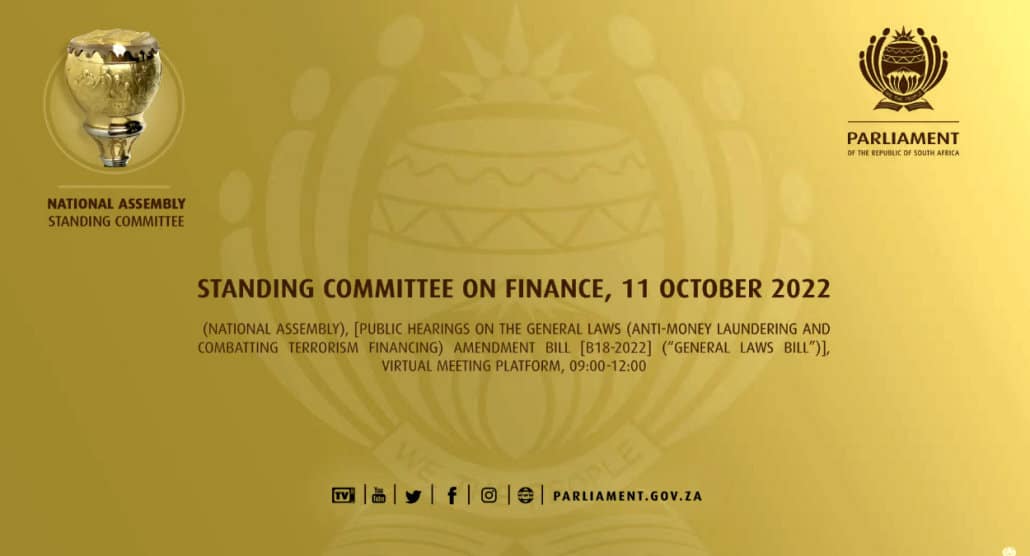In a comprehensive joint submission to Parliament’s Standing Committee on Finance today, non-profit organisations Corruption Watch and AmaBhungane expressed concern that the haste with which the General Laws (Anti-Money Laundering and Combating Terrorism Financing) Amendment Bill was developed may have compromised its effectiveness.
The bill was prepared in a matter of months after the Financial Action Task Force (FATF) found problems in its 2021 mutual evaluation review of South Africa’s systems for anti-money laundering, counter financing of terrorism and counter financing of proliferation of weapons of mass destruction.
South Africa was found to be only partially compliant with FATF recommendations 8, 24 and 25, which deal with non-profit organisations, the transparency and beneficial ownership of legal persons, and the transparency and beneficial ownership of legal arrangements, respectively.
FATF noted that, while there is a solid legal framework in place to fight money laundering and terrorist and proliferation financing, there were “significant shortcomings implementing an effective system, including a failure to pursue serious cases, especially those linked to so-called ‘state capture’.”
In other words, the laws are great but implementation remains the problem.
With the threat of grey-listing hanging overhead, swiftness was necessary to plug the gaps identified by FATF and implement the priority actions it recommended. The resulting amendment bill proposes a sweeping range of integrated reforms to what were previously disparate pieces of legislation and which regulated vastly different areas of concern – trusts; non-profit organisations; companies; and matters concerning the Financial Intelligence Centre. Legislation to be amended includes the Trust Property Control Act; the Non-profit Organisations Act; the Financial Intelligence Centre Act, the Companies Act, and the Financial Sector Regulation Act.
Identifying the gaps
The organisations appreciate the importance of responding swiftly and comprehensively to the FATF report, but are concerned at the impact this haste has had on the content of the bill and on the short time frame for public participation. They further express disappointment that “the Ministry of Finance, Parliament and the public have not been given the time to grapple fully with these issues”.
The joint submission aimed to flag the gaps identified in the bill, and to advocate for a more robust and sustainable approach to implementing these reforms in South Africa.
Neither organisation is a stranger to legislative submissions and have both been active in the development of the Companies Act Amendment Bill, while AmaBhungane submitted on the Non-profit Organisations Amendment Bill.
In addition, in July 2022 Corruption Watch participated in a national risk assessment with the Financial Intelligence Centre (FIC), and submitted a detailed report to the FIC on key risks and vulnerabilities within the country’s legal and regulatory framework relating to beneficial ownership, with accompanying recommendations. The report is attached as an annexure to the submissions.
The organisations summarise their main recommendations as follows:
- 1. A simplified and consolidated definition of “beneficial owner” which applies across all relevant legislation.
- 2. The removal of the possibility of a non-natural person falling under the definition of “beneficial owner”.
- 3. A consolidation of beneficial ownership register information and the inclusion of the BODS.
- 4. The prohibition of nominee arrangements.
- 5. The strengthening of administrative sanctions to improve compliance.
- 6. The inclusion of an exemption for journalists from reporting obligations which would constitute the commission of an offence.
- 7. The creation of a proactive disclosure regime for all registers of beneficial ownership information, and a legislative confirmation of the right of access to this information.
- 8. A requirement for full public participation in the drafting of regulations under the Bill’s composite pieces of legislation be included in any relevant amendments.
- 9. That the offences for trustees be increased in line with other relevant legislation.
- 10. In respect of information sharing between state entities, the use of “government department” be replaced with “organ of state”.
- 11. A full assessment of the NPO sector and its vulnerability to terrorism financing be conducted, and (including if such an assessment has been conducted) shared with the public.
- 12. A removal of the compulsory registration requirement for NPOs with the DSD, and a system implemented where all NPOs above a certain annual turnover threshold be required to register with one of the existing financial oversight entities (the CIPC or SARS).
Download the full submission for all the details.

